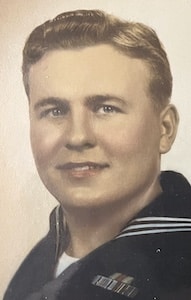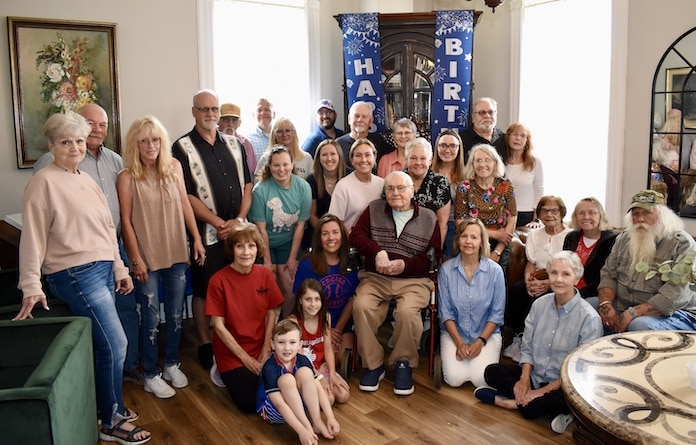‘Live and let live’ for D-Day vet

The Great Depression, the attack on Pearl Harbor, the Normandy landings on D-Day and so many events and developments of the early and mid-20th century are just history lessons for most people, black and white photos that feel distant and long ago.
But one man in Monroe County can tell you what it was like to live through all of it.
At a spry and sharp 102, Melvin Becherer was recently surrounded by family as he celebrated another year beyond the centennial milestone Saturday in Waterloo. And while he’s undoubtedly told a great many stories to his kids, grandkids and the even younger members of his family, he also offered to share some of his memories with the Republic-Times and its readers.
While Becherer currently resides in Columbia – and has since he was 50 – he was born and raised in Belleville.
Brought up among his five brothers and three sisters, his father passed away in 1929 when Becherer was just 3.
His family facing the Great Depression when he was just a child, Becherer recalled how he didn’t really recognize there was a depression going on, his family just getting by as they could, with his older siblings finding work and bringing the money back home to their mother.
“That’s when the Depression hit, right during the Depression, I don’t know how we ever made it through that,” Becherer said. “We stayed together as a family.”
Like his older brothers, Becherer wound up stepping away from school when he was of age to work in a coal mine.
With a brief interruption, he returned to that work after his military service, ultimately finding his professional passion as a mechanic for Union Electric, where he worked for decades before retiring in 1980.
His daughter, Nancy DeFabio – one of his three kids alongside Mel Jr. and Daryl – joined him as he recounted his experiences and remarked on his penchant for tinkering with machines.
“He continued to work and fix things, take lawnmowers apart and put them together, cars and everything else,” DeFabio said. “He liked his work.”
It was his time with Union Electric that actually led him to Columbia as he found himself working at the Meramec Power Plant.
While Becherer was a mechanic for many years and a hard worker well before that, his career – like many others in his generation – was put on hold amid World War II.
Though he didn’t personally witness the attack on Pearl Harbor when he was 18, he was, as he said, “just in time for the draft,” and wound up being brought into the military at age 20.
He opted to join the U.S. Coast Guard, training at Manhattan Beach in New York.
Becherer recalled joining the D-Day invasion thanks to a matter of happenstance.
“They needed some volunteers for some secret outfit. That’s where I goofed up,” Becherer said. “I ended up in Europe, war with Germany, and I was assigned to a replacement on a landing craft.”
There for about a year on an infantry landing craft, Bechererwas 20 during the Invasion of Normandy in France on June 6, 1944. He celebrated his 21st birthday just four days later.
“During the sixth, that was the invasion,” Becherer said. “June 10 was my 21st birthday. But it seems strange. The next year, I was back home. I can’t believe that. One year after the invasion, and I was back home, discharged in August 1945.”
He offered a distinct recollection of the invasion – a vastly different experience hearing a firsthand account compared to reading about the event or watching a theatrical reproduction.
Becherer described it with an almost fond familiarity and wonder, painting a picture of the chaos – particularly the intense shelling.
“It was really something to watch, to see the airplanes and the battleships and ships, how they bombarded the beach first and still there was resistance,” Becherer said. “There was a battleship out there, and it would shoot projectiles up through the clouds. You could see it go 20 miles almost, and then you hear ‘boom, boom,’ just picking away, ‘boom, boom,’ and then all at once.”
As he said, battleship shelling also made for quite the July 4 celebration.
“They all opened fire,” Becherer said. “You wanna see fireworks? That was a firework.”
With his experience during the landings being remarkable on their own, Becherer also recalled how a mine in the water during the invasion had survived the sweepers that had cleared out the waters.
That mine exploded against a ship right behind Becherer’s, though he remarked – with a terrific sense of humor – that the mine first scraped against the ship he was on.
He recalled one of his peers at the time commenting, “They can bump against your ship, but they don’t have to go off.”
While his experience in the military was plenty to discuss on its own, Becherer also spoke about his life in general, commenting on the changes in technology over the decades he’s been around.
He remarked on how his horse and buggy changed into a Model T, then a Model A, then a 1943 Chevy and beyond.
He commented on the expansion of electricity and getting a telephone as well as central heating and the first refrigerator in his family that replaced the ice box.
In his early life, Becherer recalled meat and other necessities getting delivered rather than folks going to one store to pick everything up.
He also noted how, as a kid, he would keep his nickels handy to get some ice cream – not from a truck – but from a gentleman with his horse making the rounds on Sunday.
Again recalling his family’s experience during the Great Depression, he spoke about homemade bread and jelly, raising a garden for vegetables while his mother made lots of soup and local farmers offered liver and other parts from butchered animals to help out.
Getting his first job picking tomatoes for $1 per day, he recalled feeling rich.
“I think I heard one person say, ‘We was poor, but we didn’t know it,’” Becherer said.
Becherer has stayed active with his mechanic work and hobby over the years, but he’s also long had a passion for music – specifically with his accordion.
Though he acknowledged his fingers don’t quite work the way he wants them to nowadays, DeFabio shared that he was able to pick up an accordion again at the recent family gathering to perform a couple tunes including “You Are My Sunshine.”
A strong Christian, Becherer didn’t have much aging advice to offer save for encouraging folks to find their faith.
“I don’t like to bring up religion often, but one thing I wish people would do is believe in Jesus when they die because who wants to go to hell?” Becherer said. “If you have to choose, why not choose that? It ain’t that bad.”
Speaking on his 102nd birthday celebration, DeFabio simply expressed her thanks for her father’s good health.
“I had trouble wrapping my head around 100,” DeFabio said. “And when he turned 101, I thought, ‘Oh, you gotta be kidding,’ and when he turned 102 I decided he is not ever gonna die. He’s going to live eternally! But I can just say I’m really thankful for his health, especially his mental health.”
She also offered some advice of her own, suggesting Becherer has been able to make it this far in large part thanks to how he’s gone through life without getting himself too worked up.
“I think Dad’s secret to life and really and truly, he never really worried about nothing,” DeFabio said. “He didn’t. He didn’t get anxious over things, didn’t get angry about things. Everybody gets angry and stuff, but he never sat and brooded on anything, was never violent angry, upset about things, let things bother him. He’s pretty much ‘live and let live,’ is what I would say.”

Pictured seated at center is Melvin Becherer surrounded by family during a recent celebration of his 102nd birthday.






